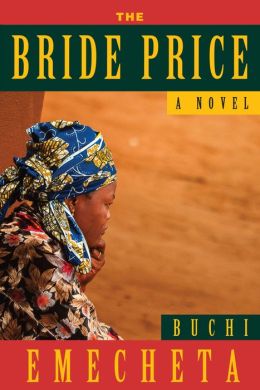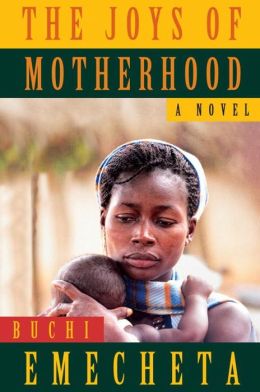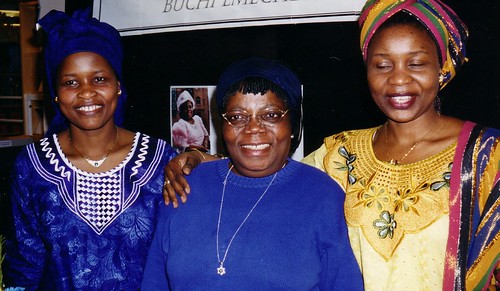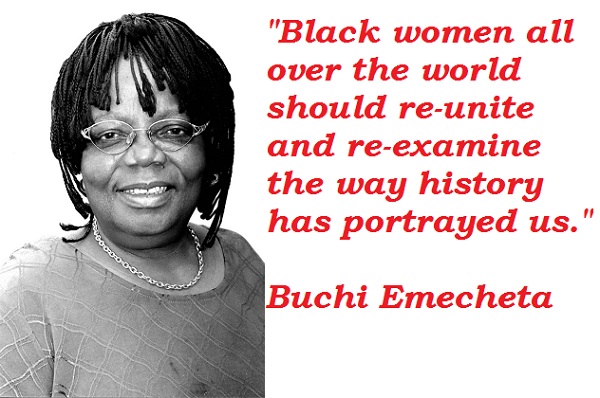“Being a woman writer, I would be deceiving myself if I said I write completely through the eye of a man. There’s nothing bad in it, but that does not make me a feminist writer. I hate that name. The tag is from the Western world – like we are called the Third World.” ~Buchi Emecheta
Florence Onye Buchi Emecheta OBE (born July 21, 1944, Lagos, Nigeria), is one of Africa’s most
acclaimed female novelist, children’s writer, screenplay writer, and autobiographer. The Britain-based writer, Buchi who is from the highly workaholic, resourceful, intelligent, creative cum intellectual ethnic Anioma people -a sub-group of the larger ndi-Igbo ethnic group in Nigeria, is among the most important female authors to emerge from post-colonial Africa.
Emecheta was married at age 16 and immigrated with her husband to London in 1962. The problems she encountered in London during the early 1960s provided background for the books that are called her immigrant novels. It has been said that “of all the women writers in contemporary African literature Buchi Emecheta of Nigeria has been the most sustained and vigorous voice of direct feminist protest (Lloyd Wellesley Brown, Women Writers in Black Africa (Westport, CT: Greenwood Press, 1981). While the genesis of African and Nigerian women’s literature began with Flora Nwapa, second generation Nigerian woman writer Buchi Emecheta’s works have created a milestone in African literature. Buchi Emecheta’s life is as exemplarily as her resilient, strong womanist characters.

Buchi whose legacy has created a path of inspiration for contemporary African and Nigerian women writers has published over 20 books, including Second-Class Citizen (1974), The Bride Price (1976), The Slave Girl (1977) The Joys of Motherhood (1979), Destination Biafra (1982), and Double Yoke (1982). Emecheta’s works deal with the portrayal of the African woman and the main characters of her novels show what it means to be a woman and mother in Nigerian and British society. Many of her books are semi-autobiographical. Although most of her realistic novels are set in Africa and explore Emecheta’s favourite themes, but, perhaps her strongest work, The Rape of Shavi (1983), which is also the most difficult to categorize and set in an imaginary idyllic African kingdom. Emecheta also wrote an autobiography, Head Above Water (1986), and several works of children’s and juvenile fiction.
As a result of her creative literary prowess that covers the themes of child slavery, motherhood, female independence and freedom through education , Emecheta has won a considerable number of awards, acclaims(accolades) and honors internationally. She won New Statesman Jock Campbell Award for ‘The Slave Girl”1979, named as one of Granta′s “Best of the Young British Novelists” in 1983. Emecheta as a “championed activist writer, and as the most prolific writer of African descent in Britain” was the featured author on the cover of Sable LitMag’s official launch issue in 2005. She was bestowed with an honour of Order of the British Empire (OBE) in 2005 for her literary achievements in British Literature. Back home in Nigeria she is included in theBuchi whose legacy has created a path of inspiration for contemporary African and Nigerian women writers has published over 20 books, including Second-Class Citizen (1974), The Bride Price (1976), The Slave Girl (1977) The Joys of Motherhood (1979), Destination Biafra (1982), and Double Yoke (1982). Emecheta’s works deal with the portrayal of the African woman and the main characters of her novels show what it means to be a woman and mother in Nigerian and British society. Many of her books are semi-autobiographical. Although most of her realistic novels are set in Africa and explore Emecheta’s favourite themes, but, perhaps her strongest work, The Rape of Shavi (1983), which is also the most difficult to categorize and set in an imaginary idyllic African kingdom. Emecheta also wrote an autobiography, Head Above Water (1986), and several works of children’s and juvenile fiction.
As a result of her creative literary prowess that covers the themes of child slavery, motherhood, female independence and freedom through education , Emecheta has won a considerable number of awards, acclaims(accolades) and honors internationally. She won New Statesman Jock Campbell Award for ‘The Slave Girl”1979, named as one of Granta′s “Best of the Young British Novelists” in 1983. Emecheta as a “championed activist writer, and as the most prolific writer of African descent in Britain” was the featured author on the cover of Sable LitMag’s official launch issue in 2005. She was bestowed with an honour of Order of the British Empire (OBE) in 2005 for her literary achievements in British Literature. Back home in Nigeria she is included in the
Buchi Emecheta, just like famous Seneglese writer and women`s rights campaigner who wrote the novel “So Long A Letter,” is always very defensive and indignant whenever she is referred to as feminist. In fact, Buchi Emecheta states that her type of feminism is an African type of feminism called womanism. Therefore within the African female struggle for self-articulation, empowerment and womanhood is the greater battle to define evolving ideologies and theories, a process which hopefully will be progressively clarified and elucidated. Emecheta rather described her novels as “stories of the world,” but from a female perspective, as she told Essence writer Elsie B. Washington “These women face the universal problems of poverty and oppression, and the longer they stay, no matter where they have come from originally, the more the problems become identical.”

Buchi Emecheta was born on 21 July 1944, in the Yaba suburb of Lagos State to Igbo parents of Anioma (Igbo sub-ethnic group) extraction. Her father Jeremy Nwabudinke, a railway worker in the 1940s and her beloved mother Alice (Okwuekwuhe) Emecheta were from Ibusa, Delta State, Nigeria. Though her father worked for the railway in Lagos, the spiritual home of the family remained the village of Ibuza, and as a young girl Emecheta traveled back there often–“during the rains, to help on the farm and to learn our ways,” she recalled in a paper delivered before the Second African Writers Conference and published in 1988’s Criticism and Ideology. Her parents were determined to instill a degree of traditional Igbo values in her, she noted. “If I lived in Lagos I could start to have loose morals and speak Yoruba all the time.”
As it was then the norm of the patriarchal Igbo society, the young Buchi Emecheta was initially kept at home while her younger brother was sent to school; but after persuading her parents to consider the benefits of her education, she spent her early childhood at an all-girl’s missionary school. Her father died when she was nine years old.
After death of her parents Emecheta stayed with her extended family and was close to her aunt, who was the oldest woman in the family, and in Igbo culture such females hold a place of respect as “Big Mother.” During Emecheta’s childhood, her Big Mother, quite old and nearly blind, told fantastic stories of the family’s Igbo ancestors. “We would sit for hours at her feet mesmerized by her trance-like voice,” Emecheta recalled in Criticism and Ideology. “Through such stories she could tell the heroic deeds of her ancestors, all our mores and all our customs. She used to tell them in such a way, in such a sing-song way that until I was about fourteen I used to think that these women were inspired by some spirits.”
As if by cosmic plan to make Emecheta a great gift to the world, at the age of 10 and year later after the death of her father and staying with her extended family, she received a full scholarship to the Methodist Girls School for her uncanny academic excellence. The young Emecheta continued her basic education in this school until the age of 16 where her education was temporary interrupted.
In tandem with the time honored-tradition and custom of ndi-Igbos which make room for betrothal marriage, Emecheta at the age of 16 was married off to Sylvester Onwordi, a student to whom she had been engaged since she was 11 years old.

Onwordi was a very enterprising young man with focus to further his education and full of desire for adventure to make a living outside of his country. He moved immediately moved to London to attend university after his traditional marriage to Emecheta. As a responsible African husband he invited his wife, Emecheta to join him in 1962. She gave birth to five children in six years. Unfortunately, their marriage which was then an oasis of peace and happiness transmogrified into a direly unhappy and sometimes violent marriage (as chronicled in her autobiographical writings such as Second-Class Citizen). To keep her sanity, Emecheta wrote in her spare time; though her English language skills were still lacking, she was determined to improve them and begin writing. The birth of five children also kept her from pursuing that goal for a time, and her husband’s lack of ambition forced her to work outside the home. She found a job in the library of the British Museum in London as a library officer in 1965 and later became a youth worker with the Inner London Education Authority. In her spare time, Emecheta wrote, but her husband resented her literary aspirations, and he ultimately burned her first manuscript.

By 1966, and at the age of 22 her marriage had disintegrated and she realized that writing might provide a more stable income for her and her children. “I thought I would wait to be as old as Big Mother with a string of degrees before writing,” she noted in Criticism and Ideology. “But I had to earn my living and the only thing I could do was write.” She therefore enrolled at the University of London, earned a BSc degree in Sociology, and began writing a regular column about the African/London experience for the New Statesman in 1972. Her essays about the culture shock she experienced, her failing marriage, racism in London, and her struggles as a working mother of five and were collected into her first book, ‘In the Ditch.” Emecheta’s second novel was Second-Class Citizen (Allison and Busby, 1974) was published two years later after “In the Ditch”. Here she drew from an earlier period in her life, when her husband was in graduate school but indifferent to his studies and abusive toward her. Both books were eventually published in one volume as Adah’s Story (1983).

The Bride Price, third published novel, was actually written in the 1960s. The first of her works to be set in Nigeria, it centers upon a young woman struggling with the cultural traditions that restrict her life in a most cruel way: her father dies when she is thirteen, and her uncle literally inherits her. She is allowed to continue her education but only because it will increase her “bride price,” the sum her uncle will receive for contracting her marriage. She falls in love with a teacher, a man from a less exalted family, and elopes with him. A Nigerian superstition warns that such a woman will die in childbirth, and the heroine fulfills this prophecy at the close of The Bride Price.

Emecheta lived in Camden, New Jersey, for a time and supported herself as a community worker there in the mid-1970s. She continued to write, and her works from this period include Slave Girl and The Joys of Motherhood. This latter work, published in 1979 with a title designed to convey irony, is typical of Emecheta’s fiction. Young Nnu Ego, from the village of Ibuza, returns to her family home in shame when she does not conceive a child as a new bride. Her father then sends her away to marry a man in Lagos, named Nnaife, and Nnu Ego detests him at first sight. Nnaife has a lowly job as a laundry worker for a white family, and Nnu Ego views him with a contempt she extends to Nigerian men in general. “Men here are too busy being white men’s servants to be men,” she thinks. Nnu Ego becomes pregnant but at first gives birth only to girls considered valueless offspring in Nigerian culture. Finally, she has a son, but he dies before he is a month old, and Nnu Ego descends into grief over him and her situation. She tries to kill herself, and a crowd gathers near the bridge to watch–“a thing like that is not permitted in Nigeria, you are simply not allowed to commit suicide in peace,” the novel states, “because everyone is responsible for the other person.”

More prosperous times eventually arrive for Nnu Ego and her eight children, especially when her husband finds a better job, but when her brother-in-law dies, Nnaife inherits his four wives, and one comes to live with his and Nnu Ego’s family. Tensions in the household increase, and here Emecheta shows the ways in which Nigerian traditions clash with the realities of modern life. A man like Nnaife cannot earn enough in a city to support such customs, but in Ibuza such a polygamous lifestyle is possible, for each wife has her own small household. In the end, their family falls apart, and the imposition of Western ways and a foreign economic system destroys Ibo traditions that once ensured stability and continuity. Male children, for instance, are expected to care for elderly parents, but Nnu Ego’s sons will not do so for her. Educated in British schools, one emigrates to Canada, while the other rejects his Ibo heritage and fully adopts the European belief in economic self-sufficiency. Nnu Ego dies by the road side, alone. “She died quietly there, with no child to hold her hand and no friend to talk to her,” the novel concludes.

Emecheta, though a committed feminist, does not view polygamy as a negative system. “In many cases polygamy can be liberating to the woman, rather than inhibiting her, especially if she is educated,” she told the audience assembled at the Second African Writers Conference. “The husband has no reason for stopping her from attending international conferences like this one, from going back to university and updating her career or even getting another degree. Polygamy encourages her to value herself as a person and look outside her family for friends.”
Another work that added to Emecheta’s literary reputation was 1982’s Double Yoke, the story of two young Nigerians who meet while university students. Ete Kamba and Nko are eager to experience life away from their families for the first time, and fall in love. They engage in premarital relations, but Ete Kamba is more conservative than Nko and comes to resent her assertive mind and desire for independence. They separate, and then her professor attempts to seduce her. “The novel is both comic and tragic in its depiction of Nko’s and Ete Kamba’s youthful, emotional extravagances and the campus response to their transgressions,” noted Jewelle Gomez in a Black Scholar review of Double Yoke. “Here, as in Emecheta’s other novels, she speaks with an undeniably Nigerian voice; makes clear the Nigerian woman’s circumscribed position in society and her skillful adaptation to it.”
Emecheta’s novels have earned critical accolades from the literary establishment. “Emecheta is no ideologue,” remarked New York Times Book Review critic Reginald McKnight, “her characters do not utter or think words that would not come from them; they are not mere representatives of larger social movements but real, complex human beings, shaped by the vicissitudes of class, culture and sexual politics. She raises the right questions, but never harangues. She writes with subtlety, power and abundant compassion.”
Other novels from Emecheta include Adah’s Story, The Moonlight Bride, and The Family. In The Rape of Shavi, first published in 1983, a plane crash in rural Africa is welcomed by tribes-people there, but the foreigners steal some valuable minerals and repair their plane just before the local chief forces them to wed; his heir stows away on the plane with the Britons. Emecheta also wrote an autobiography, Head above Water, and a 1990 novel that delves into the colonial experience in the Caribbean. The title character in Gwendolen is just eight years old when the novel opens and lives in Granville, Jamaica. Gwendolen remains with family members when her parents emigrate to England–referred to as “Molder Kontry”–but is traumatized when her grandmother’s boyfriend sexually assaults her. Eventually she joins her parents in London, and her father also abuses her. The work, written in Jamaican patois, also chronicles her deep humiliation at school because of her language skills. McKnight, writing in the New York Times Book Review, called it a “rich, complex and fast-moving novel.”
Emecheta’s 1994 novel, Kehinde, depicts the ongoing conflict for Africans living abroad. Kehinde Okolo is a 35-year-old Londoner of Nigerian descent with a management position in international banking. She is also married with two children, but her husband’s small business does not satisfy him, and he wishes to return home. In his village, he is likely to become chief, and in the end, Kehinde agrees to the plan but stays in London for a time to sell their home. When she arrives in Nigeria, she finds that her husband has taken another wife, with whom he now has two new children. In the village, Kehinde has no status her position in the family is eclipsed by her husband’s sisters and finds herself increasingly troubled by circumstances that surrounded her birth. She was a twin, but the other was stillborn, and their mother died in childbirth; Kehinde suffers from the belief that she was responsible.
Following her success as an author, Emecheta travelled widely as a visiting professor and lecturer. From 1972 to 1979 she visited several American universities, including Pennsylvania State University, Rutgers University, the University of California, Los Angeles, and the University of Illinois at Urbana-Champaign.
From 1980 to 1981, she was senior resident fellow and visiting professor of English, University of Calabar, Nigeria. In 1982 she lectured at Yale University, and the University of London, as well as holding a fellowship at the University of London in 1986.
From 1982 to 1983 Buchi Emecheta, together with her journalist son Sylvester, ran the Ogwugwu Afor Publishing Company.
Emecheta returned to Nigeria frequently and to her family in Ibuza. In addition to pursuing her creative work, she held numerous academic posts including stints at Yale and London universities. For a time in the early 1980s she ran a publishing company called Ogwugwu Afor; as of 1979 she was a member of the Britain’s Advisory Council on Race. “I am simply doing what my Big Mother was doing for free about thirty years ago,” she said of her career as a novelist in the Criticism and Ideology paper. “The only difference is that she told her stories in the moonlight, while I have to bang away at a typewriter I picked up from Woolworth’s in London.”






